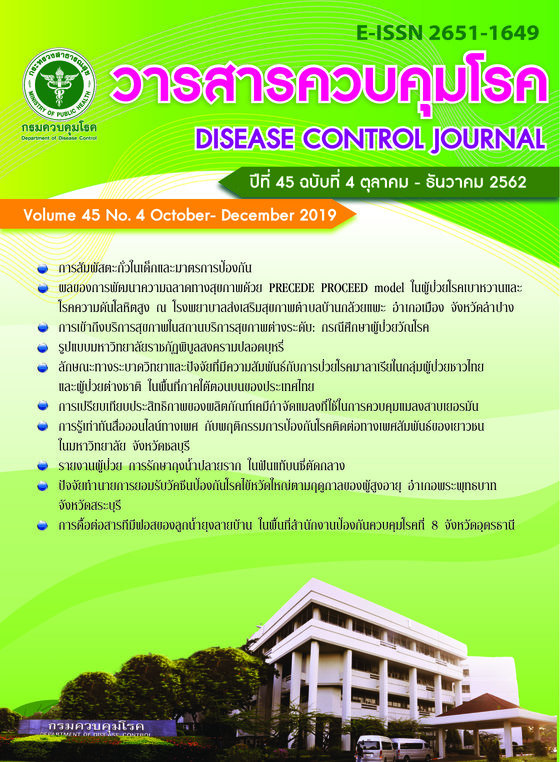Effectiveness of the PRECEDE PROCEED model on health literacy among diabetes and hypertension patients at Ban Kluai Phae Sub-district Health Promoting Hospital, Lampang
DOI:
https://doi.org/10.14456/dcj.2019.32Keywords:
diabetes, hypertension, health literacy, PRECEDE PROCEED modelAbstract
This study aimed to assess the effectiveness of interventions based on the ‘PRECEDE- PROCEED model’ and its impact on the health literacy of patients with type 2 diabetes and hypertension. The study utilized a quasi-experimental methodology. Thirty-nine patients from Ban Kluai Phae Sub-district Health Promoting Hospital participated as an experimental group, and with 35 patients recruited from other health care providers as a comparison group. A four-month intervention based on the PRECEDE-PROCEED model was provided for the experimental group and the pre- and post-intervention health literacy of the participants was evaluated using a questionnaire. Descriptive statistics and t-test were used for data analysis. The results show that, after the 4-month intervention, in the experimental group the percentage of subjects with knowledge of interactive health literacy and of critical health literacy increased from 63.00% to 71.79% and from 11.60% to 25.64%, respectively. The pre- and post-intervention mean health literacy scores of the experimental group were statistically different (pre-intervention mean score = 79.85, SD = 22.489; post-intervention mean score = 91.72, SD = 13.296 p<0.007). However, the mean health literacy scores for the experimental group (mean = 91.72, SD = 13.296) and the comparison group (mean = 90.71, SD = 8.767) were not significantly different. Patients exposed to the intervention were more likely to be successful in controlling blood pressure and blood sugar levels, i.e. the percentage of patients with normal blood pressure rose from 57.98% to 96.45%, and, at the same time, the percentage of those with normal blood sugar increased from 87.36% to 94.14%. These findings indicate that interventions based on the PRECEDE-PROCEED model have proved to be an effective approach to improving health literacy and controlling the disease among patients with diabetes and hypertension.
Downloads
References
2. Apikomolkorn Y. The prevalence of hypertension and diabetes and patients’ health literacy in the catchment area of Ban Kluai Phae district health promotion hospital, Amphoe Meuang, Lampang Province. Sci Res J, Lampang Rajabhat University 2017;2:1-16.
3. Health Education Division, Department of Health Service Support. Health literacy development guidelines for achieving health behavior change (food, exercise, emotion, smoking, and alcohol cessation) and risk reduction. Nonthaburi: Health Education Division; 2013.
4. Ishikawa H, Kiuchi T. Health literacy and health communication. Biopsychosoc Med 2010;4:18.
5. Nipaspong K, Pantapalin P, Jeenfung W, Srikomoot C, Intarasit P, Chaiard P, et al. The effectiveness of a dietary behavior management program of people with over nutrition by participation of families in Lumpini Ramintra condominiums, Laksi, Bangkok. In: Nursing professional development project academic conference: to present the empirical work; 2015 Jul 14; Public Health Nursing Division, Bureau of Health, Bangkok Metropolis, Bangkok: 2015. p. 49-57.
6. Intarakamhang U. Creating and developing Thailand health literacy scales for Thai people aged 15 years and over in health promotion (food, exercise, emotion, smoking, and alcohol cessation). Bangkok: Behavioral Science Research Institute, Srinakharinwirot University; 2013.
7. Ratanapitak U, Krainuwat K, Sriwijitkamol A, Vipawattana C. The effects of a diabetic self-management program on knowledge, behavior, and health indexes among people with type 2 diabetes. J Nurs Sci 2013;31:7-18.
8. Moshki M, Dehnoalian A, Alami A. Effect of precede–proceed model on preventive behaviors for type 2 diabetes mellitus in high-risk individuals. Clin Nurs Res 2017;26:241-53.
9. Dizaji MB, Taghdisi MH, Solhi M, Hoseini SM, Shafieyan Z, Qorbani M, et al. Effects of educational intervention based on PRECEDE model on self care behaviors and control in patients with type 2 diabetes in 2012. J Diabetes Metab Disord 2014;13:72.
10.Wannasirikul P, Termsirikulchai L, Sujirarat D, Benjakul S, Tanasugarn C. Health literacy, medication adherence, and blood pressure level among hypertensive older adults treated at primary health care centers. Southeast Asian J Trop Med Public Health 2016;47:109-20.
Downloads
Published
How to Cite
Issue
Section
License
Articles published in the Disease Control Journal are considered as academic work, research or analysis of the personal opinion of the authors, not the opinion of the Thailand Department of Disease Control or editorial team. The authors must be responsible for their articles.






